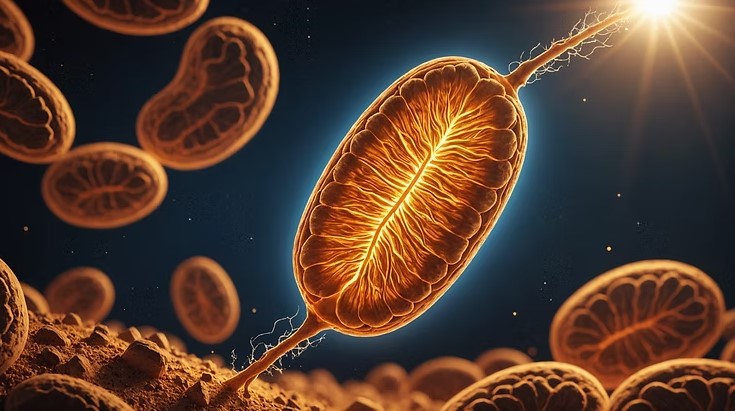How Do Tiny Powerhouses Keep You Going?
The Mystery Behind Mitochondrial Energy Production and How to Support It
Carrie Elizabeth
9/28/20254 min read


Have you ever stopped to consider the source of your daily energy? We often talk about nutrition and exercise, but the real power players are the mitochondria in our cells. These tiny organelles, also known as the "powerhouses of the cell," are essential for energy production. By grasping how mitochondria function, we can learn to enhance our energy levels through informed food choices and lifestyle changes.
The Role of Mitochondria
Mitochondria are tiny structures located in almost every cell in your body. Their primary function is to transform nutrients from the food we eat into energy. They do this efficiently through a process called cellular respiration, which generates adenosine triphosphate (ATP)—the energy currency that fuels everything from muscle contractions to maintaining overall cell health.
The Process of Energy Production
Mitochondria create energy through several detailed steps:
Glycolysis: This initial process occurs in the cytoplasm, where glucose is broken down into pyruvate.
The Krebs Cycle: In this cycle, which happens inside the mitochondria, pyruvate is converted to acetyl-CoA. This generates crucial electron carriers, NADH and FADH2, along with additional ATP. Remarkably, the Krebs cycle can produce about 30 molecules of ATP from a single glucose molecule.
Electron Transport Chain (ETC): Located in the inner mitochondrial membrane, the ETC receives electrons from NADH and FADH2. When these electrons pass through the chain, they help pump protons across the membrane, creating a gradient that powers ATP synthase. This process produces the majority of ATP—about 26 to 28 molecules per glucose molecule.
Factors Affecting Mitochondrial Health
Mitochondrial performance can change due to various elements, such as age, genetics, and lifestyle choices. Research indicates that mitochondrial dysfunction is linked to several age-related conditions, including Alzheimer’s disease and diabetes. Studies show that individuals with better mitochondrial function may experience a 20-30% reduction in risk for chronic diseases.
Dietary Influences on Mitochondrial Function
The foods we consume significantly affect how well our mitochondria operate. Nutrient-rich foods provide essential elements for optimal energy production. Here are some key nutrients to consider:
B Vitamins: B1, B2, B3, B5, B6, and B12 are vital for mitochondrial energy metabolism. For example, B1 deficiency can lead to decreased ATP production and fatigue. Great food sources of B vitamins include liver, wild salmon, grass finished beef, avocado, pastured eggs, lentils, and free-range chicken.
Omega-3 Fatty Acids: Abundant in fish like salmon, mackerel, herring, and sources like flaxseeds, omega-3s help maintain mitochondrial membrane health and reduce inflammation. Research suggests that diets high in omega-3s can improve mitochondrial activity by up to 20%.
Antioxidants: Antioxidants foods like berries, green tea, herbs, spices, artichokes, dark chocolate, and pecans help combat oxidative stress, which can impair mitochondrial function. Studies indicate that diets rich in antioxidants can lead to a 15% increase in mitochondrial efficiency over time.
CoQ10: Found in meat and fish, CoQ10 is crucial for ATP production. Supplementation with CoQ10 has shown benefits in improving energy levels for those with chronic fatigue.
Lifestyle Strategies to Support Mitochondrial Health
Your daily habits can have a significant impact on mitochondrial function. Below are strategies that can enhance mitochondrial health:
Exercise Regularly: Engaging in consistent physical activity, especially endurance exercises like running or cycling, can double the number of mitochondria in your cells. Studies indicate that just 30 minutes of moderate exercise can improve mitochondrial function by up to 30%.
Reduce Stress: Chronic stress can lead to mitochondrial dysfunction. Incorporating practices like yoga, meditation, journaling, and deep-breathing exercises can lower stress hormones and improve energy levels.
Prioritize Sleep: Quality sleep is critical for energy and overall health. Research suggests adults who consistently get 7-9 hours of sleep have better mitochondrial efficiency and higher ATP production.
Limit Toxins: Environmental pollutants can damage mitochondria. Choosing organic foods when possible, and minimizing the use of toxic cleaning products can help protect your mitochondrial health. Detoxification programs are essential for reaching optimal health, since we are hit with a highly unnatural onslaught of toxins in our air, food, water, clothing, and personal care products. CLICK HERE TO CHECK OUT NEXT LEVEL WELLNESS'S DETOX PROGRAMS
Intermittent Fasting: This dietary approach can promote the growth of new mitochondria and enhance their function. Studies show that engaging in intermittent fasting can lead to a 50% increase in mitochondrial biogenesis. This would be doing all of your eating for the day within at 4-10 hour window of time. 10 hours is better for women because of their hormone needs.
Dietary Supplements for Mitochondrial Support
If you're looking to give your mitochondria an extra boost, consider these dietary supplements known for their potential benefits:
CoQ10: As previously mentioned, this supplement is essential for ATP production and may increase your overall energy.
PQQ: Pyrroloquinoline Quinone is the only supplement found capable of generating new mitochondria, where in the past it was thought that only strenuous exercise and calorie restriction could do that. This incredible antioxidant is capable of 20,000 rounds of neutralizing free radicals, as opposed to vitamin C which can only do 4 rounds!
Acetyl-L-Carnitine: This supplement has been linked to better fat metabolism and may enhance mitochondrial energy production significantly.
Nicotinamide Adenine Dinucleotide (NAD+): Essential for energy production, NAD+ levels decline with age. Research shows that supplementation with NAD+ precursors (NA, NAM, NR, NMN, and tryptophan) can boost mitochondrial performance, potentially improving energy levels by up to 30%.
Your Path to Vibrant Energy
Mitochondria are essential to our ability to generate energy and maintain health. Understanding how they operate and what influences their efficiency allows us to make better food choices and cultivate healthier lifestyles. Taking small steps towards supporting your mitochondria can lead to noticeable improvements in your energy and overall well-being. Why not start today? Embrace the power of these tiny organelles and watch your energy soar!

